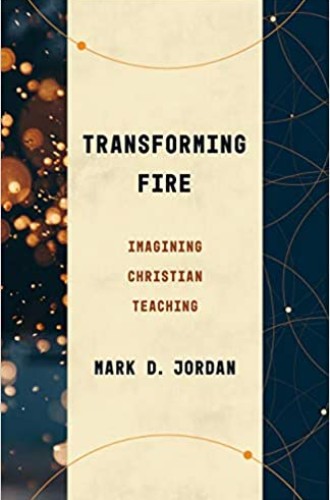Imagine how Christian teaching could transform our lives
Mark Jordan’s gentle, urgent invitation
“Our theology is written and taught under sin,” writes Mark Jordan. “It is, after all, our theology.” These words appear within an appeal for readers to be generous in assessing the two “Christian texts about teaching through bodies” that Jordan has just presented, Gregory of Nyssa’s Life of Macrina and Marcella Althaus-Reid’s Indecent Theology. “To imagine that we could purify ourselves by purging others” with whom we disagree, writes Jordan, “is a worse mistake” than spending too much time with their words in the hope that we might learn something from them.
Playful juxtapositions like this one—and the hermeneutical openness they commend—are the heart of Transforming Fire. They animate the book, giving life to what it invites: come, let us imagine together how Christian teaching can transform the lives, the hearts, and the practices of those who encounter it. It’s a gentle invitation, but it’s also urgent. “Even as institutions of theological education shrink or vanish,” Jordan writes early in the book, “some of the available patterns of Christian teaching might still work wonders.”
Jordan finds these patterns in texts that have long been used in theological classrooms, some for decades and others for centuries. He examines C. S. Lewis’s The Lion, the Witch, and the Wardrobe alongside Octavia Butler’s Parable of the Sower as a way of thinking about power relations within various stages of Christian formation. He juxtaposes Bonaventure’s The Mind’s Path into God with Paul Tillich’s The Courage to Be to consider what happens when the boundaries of knowledge change. He creates a conversation between Teresa of Ávila and John Bunyan and another between Søren Kierkegaard and Simone Weil. Each of these pairings illuminates a facet of what it means to find oneself caught up in theology, shaped by it and shaping it.
The kind of transformative teaching Jordan calls forth is rooted in his belief that “the most influential Christian texts set forth the means by which their lessons are to be taught.” Not only do such texts demand spaces and energies for learning that transcend the classroom, they create those spaces and energies. These texts shape the bodies of their readers, thereby affirming “the experience of generations of Christians who have placed their hopes in remembered words.” This conviction is rooted in Jordan’s sense that teachers and learners are, above all, living bodies who work to create meaning together—sometimes atrociously and other times beautifully—in the spaces where texts and bodies converge.
Bodies are shaped by desires, and the written words that come from bodies aim to form the desires of their readers. Thus the words of a man named Gregory and those of a woman named Marcella can be in conversation, even if their vast differences—starting with the 1,600 years that separate them—make them seem unlikely partners. Jordan finds in each of them an important truth: that theology is about bodies and bodies are messy:
The actual bodies described or addressed by Christian theology are not tidy. The body of Jesus is familiar, radiant, tortured, unrecognizable. Sometimes he is startled when touched. Sometimes he spits into the soil to make healing paste. He lounges at table with the “unclean.” He consorts with the sick. He has, in the canonical Gospels, no sexual relations or desires. According to one old tradition, he was ugly. . . . That sort of body is theology’s assigned object and subject.
The human bodies that show up in Life of Macrina and Indecent Theology might also be perceived by readers as familiar, radiant, tortured, unrecognizable. In the scene created by this perception, readers might then also locate their own bodies, as well as the body of Jesus.
Such interplay between texts and bodies requires levels of time, attention, vulnerability, and conversational fluidity that are not always afforded in classrooms. Just as a Christian text can create scenes that transform readers, it can also be prevented from doing so—by abusive pedagogies, coercive outcome measurements, or disciplinary rigidity. This is why the lessons Jordan gleans from his textual interlocutors—lessons about the body, power, imagination, and ways of knowing—are so important. Teachers can help create conditions that allow ancient words and bodies to share space with new words and bodies, each transforming the other.
The transformation that happens in that space is the work of everyone who inhabits it. But it’s also the work of God. When our pedagogy does ignite imaginations and reshape hearts, it is because we have witnessed the most significant pedagogy of all: the unlikely convergence of time and eternity in a messy first-century body. “The Great Scene of instruction is not a universal encyclopedia but a frightening redemption enacted long ago—and each today—outside Jerusalem.” The recapitulation of that scene is where Christian teaching begins and ends.
“We need a story about how we have forgotten that words sometimes carry the weight of all flesh,” Jordan writes, diagnosing the state of our culture. “We need the story, and we are the ones to tell it.” All theology, Jordan reminds us, is written and taught and received by sinners. This may seem like bleak news. But those sinners are also “disciples who have already been sought—by God, who took our flesh.” This seeking is the gift that appears again and again in Transforming Fire, sometimes in flashes and often in glimmers.







